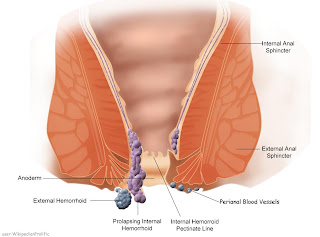Rectal Bleeding Definition and Facts. The rectum is the last portion of the large bowel that ends just before the anus. It is called rectal bleeding because the rectum lies immediately above the anus , but red blood in the stool may be coming from the rectum, as discussed later, but it also may be coming from other parts of the gastrointestinal tract.
In most cases, bright red blood indicates bleeding in the. If you have rectal bleeding that has not been examined by a medical professional, you should seek treatment.
Can rectal bleeding cause anemia? In some cases, rectal bleeding can be a symptom of a serious disease, such as colorectal cancer. Therefore, all rectal bleeding should be reported to the primary care physician. He or she can do a rectal examination or order tests like a colonoscopy to determine the cause of the bleeding.
Anal bleeding in dogs can occur due to many different reasons. The origin of the bleeding , however, can differ. Most rectal bleeding comes from the colon, rectum, or anus and can be associated with diarrhea.

The color of the blood during rectal bleeding often depends on the location of the bleeding in the gastrointestinal tract. Generally, the closer the bleeding site is to the anus , the blood will be a brighter red. Your rectum makes up the last few inches of your large intestine. Common causes of bleeding from the anus include constipation, anal fissures, and hemorrhoids. They may cause minor bleeding.
Maroon or black blood is usually caused by bleeding higher in the gut. Bleeding ulcers in the stomach or high in the small intestine cause black or tarry bowel motions. Overuse of alcohol, aspirin or other anti-inflammatory medication can cause bleeding higher in the gut. You might be bleeding from the bottom if you have: blood on your toilet paper red streaks on the outside of your poo pink water in the toilet bowl blood in your poo or bloody diarrhoea very dark, smelly poo (this can be blood mixed in poo) A small amount of one-off bleeding can often go away on its.
A person with rectal bleeding has bleeding from the rectum or anus. Blood loss from rectal bleeding may cause symptoms of anemia. Since hard stools can make it more likely to have rectal bleeding , you want to do what you can to avoid them. A hard stool not only can cause straining on the toilet, which can lead to hemorrhoids, it can also result in a tear in the skin of the anus (an anal fissure), which is a common cause of rectal bleeding.
In general, bright-red blood means the bleeding has come from somewhere near your anus. This is a typical sign of piles (haemorrhoids) or a small tear (anal fissure) in the skin of your anus.
Alcohol does not directly cause rectal bleeding. Hemorrhoids occur inside. Long-term use of alcohol causes damage that can cause rectal bleeding. Alcohol can cause cancer, gastrointestinal issues and even liver damage.
Limiting your drinking or avoiding alcohol can prevent the onset of illnesses that cause rectal. Anal itching can refer to the continued urge to scratch the skin around your anus. This annoying itch can be felt on bum cheek or inside the anus. For most people, it is often intense at night and could lead to difficult when sleeping.
Here is an insight on what causes this urge to scratch, how to relieve, stop and get rid of the symptom with simple and effective natural remedies at home. Bleeding in the digestive tract is a symptom of a problem rather than a disease itself. It usually happens due to conditions that can be cured or controlle such as hemorrhoids. Garlic capsules are being widely touted today as a natural antibiotic and a significant contributor to lower cholesterol levels. But garlic, too, can cause the blood-thinning symptoms of rectal bleeding.
It is recommended that those with bleeding disorders and people with bloody stools avoid garlic supplements altogether.

Hiç yorum yok:
Yorum Gönder
Not: Yalnızca bu blogun üyesi yorum gönderebilir.